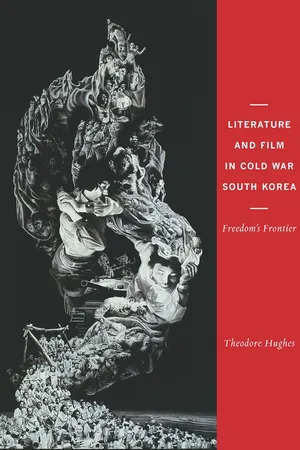
Literature and Film in Cold War South Korea
Freedom's Frontier
- English
- ePUB (mobile friendly)
- Available on iOS & Android
About this book
Korean writers and filmmakers crossed literary and visual cultures in multilayered ways under Japanese colonial rule (1910–1945). Taking advantage of new modes and media that emerged in the early twentieth century, these artists sought subtle strategies for representing the realities of colonialism and global modernity. Theodore Hughes begins by unpacking the relations among literature, film, and art in Korea's colonial period, paying particular attention to the emerging proletarian movement, literary modernism, nativism, and wartime mobilization. He then demonstrates how these developments informed the efforts of post-1945 writers and filmmakers as they confronted the aftershocks of colonialism and the formation of separate regimes in North and South Korea.
Hughes puts neglected Korean literary texts, art, and film into conversation with studies on Japanese imperialism and Korea's colonial history. At the same time, he locates post-1945 South Korean cultural production within the transnational circulation of texts, ideas, and images that took place in the first three decades of the Cold War. The incorporation of the Korean Peninsula into the global Cold War order, Hughes argues, must be understood through the politics of the visual. In Literature and Film in Cold War South Korea, he identifies ways of seeing that are central to the organization of a postcolonial culture of division, authoritarianism, and modernization.
Frequently asked questions
- Essential is ideal for learners and professionals who enjoy exploring a wide range of subjects. Access the Essential Library with 800,000+ trusted titles and best-sellers across business, personal growth, and the humanities. Includes unlimited reading time and Standard Read Aloud voice.
- Complete: Perfect for advanced learners and researchers needing full, unrestricted access. Unlock 1.4M+ books across hundreds of subjects, including academic and specialized titles. The Complete Plan also includes advanced features like Premium Read Aloud and Research Assistant.
Please note we cannot support devices running on iOS 13 and Android 7 or earlier. Learn more about using the app.
Information
Table of contents
- Cover
- Title Page
- Copyright
- Contents
- List of Illustrations
- Acknowledgments
- Introduction
- 1. Visuality and the Colonial Modern: The Technics of Proletarian Culture, Nativism, Modernism, and Mobilization
- 2. Visible and Invisible States: Liberation, Occupation, Division
- 3. Ambivalent Anticommunism: The Politics of Despair and the Erotics of Language
- 4. Development as Devolution: Overcoming Communism and the “Land of Excrement” Incident
- 5. Return to the Colonial Present: Translation, Collaboration, Pan-Asianism
- Postscript
- Notes
- Selected Bibliography
- Index